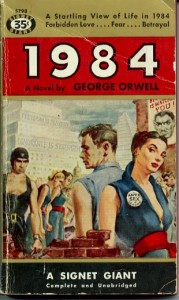1984
What impulse compelled me to pick up this book from the Walmart shelf and purchase it? The bargain price of $5.97? The fact that I graduated from high school in 1984? Its classic status and my guilt over never having read it? The fact that I once had a teacher with the same name as the protagonist?
2009 marks the 60th anniversary of 1984, and in some ways I feel like I’ve been reading it for that long. Such an unrelentingly dark book was hard to stomach, still harder to make myself reflect upon. So I won’t — for very long.
I see its genius. Orwell’s prescience in 1949 is pretty amazing. Like That Hideous Strength, this book creates a dystopia that zeros in on misuse of language (word destruction, in this book) as a way of taking totalitarian ideology to its absurd extreme. The world of 1984 denies any objective reality, paints a disturbing picture of war-maintenance as a way of preserving a class society, and walks us wearily through the destruction of Walter Mitty-esque protagonist Winston Smith. But unlike the dystopia of That Hideous Strength, this one is devoid of wit or any glimmer of hope.
Maybe a book in which nonsense speech (”Newspeak”) and irrationality (”Doublethink”) figure so prominently represents a particular challenge for a literary work — a creation of words. Parts of it didn’t seem to fit together, particularly the long digression into the theoretical “rebellion handbook” around the middle. It didn’t help that at page 92 of my Signet Classics edition it skipped 33 pages, jumping to wrongly-inserted pages 205-236, then back to 125 and proceeding in sequence to the end. I suddenly veered from Winston’s conversation with an old man to a romantic tryst in process. Part of me was delighted; besides the shot of adrenaline from the jolt in plot, I was being let off the hook of those 33 pages. But part of me was irrationally irritated. If I’m going to perform an act of intellectual duty, I want to do the whole thing.
Of course it’s a book that raises questions worth considering, and it will probably come back to me when I’m reacting to current events or reading other things. The historylessness of the future, for Orwell, was especially interesting to me. But for now I’m glad to be able to move on to the next book — hopefully Washington: The Indispensable Man, which should arrive in the mail tomorrow or the next day.



